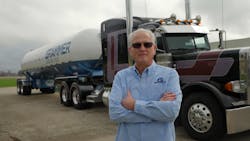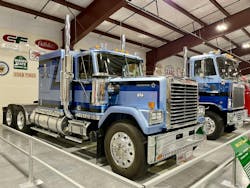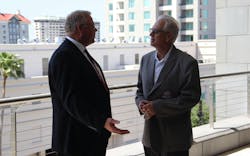Stories for days: Schroyer embraces tanker spotlight
Mark Schroyer loves tanks—almost as much as he loves trucks.
The Grammer Logistics driver and his brothers have more than 70 classic Class 8 tractors in their collection, with many of them available to admire at the Iowa 80 Trucking Museum and conventions hosted by the American Truck Historical Society—where Schroyer is a past president and the organization’s scholarship memorializes his father. So it’s no surprise the newly crowned National Tank Truck Carriers Driver of the Year used some of his time on stage at the 2025 NTTC Annual Conference in Tampa, Florida, to make a pitch for a truck restoration show.
“That’s my dream,” Schroyer said. “I’m not a veteran, but I always wished I would have joined the military. I’ve got so much appreciation for veterans and people currently serving in the military. So it’d be such a cool thing to show the restoration of that Peterbilt truck, which was built during World War II, and share it with everybody in the country—veterans, truck people, and the public as well. It’d be a very interesting project.”
See also: Tank truckers mark NTTC’s 80th birthday
Bulk Transporter sat down with the 64-year-old chemical hauler the day after he claimed NTTC’s 2024-25 William A. Usher Sr. trophy to learn more about his passion for trucking, his family’s extensive truck collection, what issues he plans to highlight, and how he’ll reach the next generation of tank truckers the industry so desperately needs.
Questions and answers are edited for length and clarity.
Bulk Transporter: What does this award mean to you?
Mark Schroyer: “It’s amazing. I told my wife the other day, as a truck driver, we really don’t get much recognition. Our companies recognize us, and give us safety awards, bonuses, and different things. But to reach this plateau has been an amazing ride. Being here for the second time, and then winning Driver of the Year, is above and beyond. I can’t tell you what this means to me as many years as I’ve been in the tank truck industry, pulling tanks. It’s been a phenomenal experience.”
BT: Did coming up short in 2024 help put you over the top this year?
MS: “I felt confident last year. I went into it not really knowing what to expect and I learned a lot. I would say it probably did help me to be a little more prepared, with the speech I gave, and my answers to the questions I was asked back in January in Washington for the interview process. When I left there, I really felt good about what I did, so I told my wife, ‘If I don't win, at least I gave it 100% and I feel good about myself.’”
BT: What sets the tank truck industry apart from other trucking segments?
MS: “I’ve always said it takes a certain caliber of driver to work in the tank truck industry. I see some of these drivers at truck stops and different places, and they’re elite, especially the ones who do what I do, with hazardous materials. Any Tom, Dick, or Harry off the street couldn’t come in and do this. It takes a lot of training and smarts to do everything we do safely and successfully.”
BT: You thanked your wife Debra and children Angie and Jamie on stage. How critical is it to have that family support back home?
MS: “Over the years, it’s been amazing. I missed a lot of a lot of things over the years, with ball games and things like that. But always, if I was home, I was there. I was there to support them in every way I could. And in return, they supported me every way they could. Neither of my kids are in the trucking industry. But they both went to college and have successful careers, and I’m proud of them. And I was always proud of my son because I’d be out working on something, maybe the car or a truck, and I’d tell him, ‘Just stand there and watch me. You don’t have to do anything.’ But he would interact, and get in there and do it, and now he can fix anything.”
BT: How did the American Truck Historical Society scholarship come to be named after your dad, George Schroyer?
MS: “When my father passed, Shorty Whittington, who owned Grammar, wanted to make a donation of some sort in my dad’s name. So we ended up starting a scholarship with the Society, and it’s really turned out to be a big hit.”
See also: Schroyer secures Usher trophy
BT: Did you feel his presence here this week?
MS: “Actually, when I was president and chairman of the board for the American Truck Historical Society, and I had to get up and run a meeting or whatever, I always wore one of his lapel pins. I thought if I did that, I’d always have him with me, and he might be able to help me along the way. And I’ve always felt it was a big help to me.”
BT: How many trucks are in your family’s collection?
MS: “We’ve probably got 35 that are restored. And we’ve got another 35 to 40 that aren’t. In fact, my wife keeps telling me, ‘Quit buying these things home. You’re never going to get them all restored before you die.’ But I just hate seeing them go to scrap, and sometimes that’s what happens if you don’t buy them. And once they’re gone, they’re gone forever.”
BT: Your first tractor was a GMC. Do you have a favorite piece in the collection?
MS: “Not really. I’ve always told everybody it amazes me we don’t have a truck in our collection that dad ran in his company, or my brothers or I ran in our companies. But I did just redo an ’07 Peterbilt I bought new. I restored it from front to back, and I’m driving it now myself, so that’ll be the only truck I can actually say I worked on and in. I can take it to shows and then drive it at work as well. I’m proud of that.”
BT: What issue do you want to highlight as the industry’s ambassador?
MS: “Just safety; and then conveying to young people how important it is to have them come into this business to keep it going. Because right now, in our industry, there are so many guys my age or older still driving who are going to be retiring. Not that I’m planning to retire anytime soon. I still enjoy this so much. I tell everybody, when I go to work, that’s my social life. I know so many people in this industry, and it’s enjoyable when I visit a shipper or receiver and hear, ‘Hey, Mark, how are you doing? Good to see you again.’ It’s a good feeling.”
BT: As the oldest driver among this year’s finalists, how will you connect with young people?
MS: “Just by telling them about the experiences I’ve had over the years. I’ve been able to do so many things throughout my career. One time I had an ammonia evacuation job at Lake Placid in New York, at the old Olympics site. They use ammonia to freeze the ice on the track. And while I was there, they were rebuilding the track, so they would run bobsleds down the mountain, and they took me up and gave me a ride down the mountain. Those are the kinds of stories I want to share, to hopefully convey to them all the wonderful experiences that make this job worthwhile. There are times you get aggravated, because you missed a ballgame when you had a run and couldn’t get home in time, or whatever. But for the most part, I’ve always managed to get to the places I really needed to be—with weddings, graduations, and that kind of stuff. I’ve been gone a few weekends during my career, but mostly I’ve been home weekends.”
About the Author
Jason McDaniel
Jason McDaniel, based in the Houston TX area, has more than 20 years of experience as an award-winning journalist. He spent 15 writing and editing for daily newspapers, including the Houston Chronicle, and began covering the commercial vehicle industry in 2018. He was named editor of Bulk Transporter and Refrigerated Transporter magazines in July 2020.




